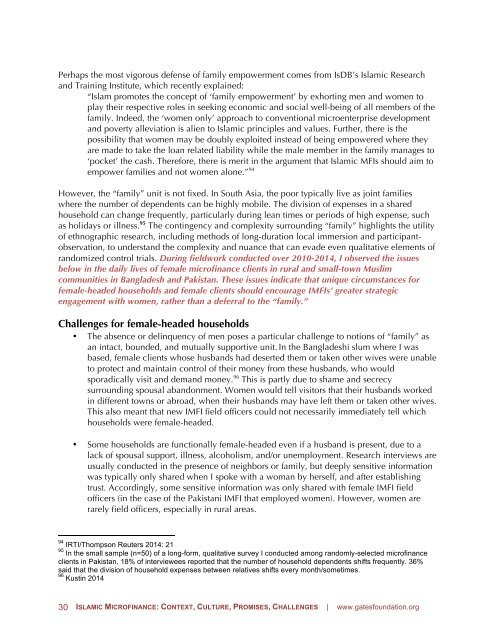ISLAMIC (MICRO)FINANCE
TrYIw
TrYIw
Create successful ePaper yourself
Turn your PDF publications into a flip-book with our unique Google optimized e-Paper software.
Perhaps the most vigorous defense of family empowerment comes from IsDB’s Islamic Research<br />
and Training Institute, which recently explained:<br />
“Islam promotes the concept of ‘family empowerment’ by exhorting men and women to<br />
play their respective roles in seeking economic and social well-being of all members of the<br />
family. Indeed, the ‘women only’ approach to conventional microenterprise development<br />
and poverty alleviation is alien to Islamic principles and values. Further, there is the<br />
possibility that women may be doubly exploited instead of being empowered where they<br />
are made to take the loan related liability while the male member in the family manages to<br />
‘pocket’ the cash. Therefore, there is merit in the argument that Islamic MFIs should aim to<br />
empower families and not women alone.” 94<br />
However, the “family” unit is not fixed. In South Asia, the poor typically live as joint families<br />
where the number of dependents can be highly mobile. The division of expenses in a shared<br />
household can change frequently, particularly during lean times or periods of high expense, such<br />
as holidays or illness. 95 The contingency and complexity surrounding “family” highlights the utility<br />
of ethnographic research, including methods of long-duration local immersion and participantobservation,<br />
to understand the complexity and nuance that can evade even qualitative elements of<br />
randomized control trials. During fieldwork conducted over 2010-2014, I observed the issues<br />
below in the daily lives of female microfinance clients in rural and small-town Muslim<br />
communities in Bangladesh and Pakistan. These issues indicate that unique circumstances for<br />
female-headed households and female clients should encourage IMFIs’ greater strategic<br />
engagement with women, rather than a deferral to the “family.”<br />
Challenges for female-headed households<br />
• The absence or delinquency of men poses a particular challenge to notions of “family” as<br />
an intact, bounded, and mutually supportive unit. In the Bangladeshi slum where I was<br />
based, female clients whose husbands had deserted them or taken other wives were unable<br />
to protect and maintain control of their money from these husbands, who would<br />
sporadically visit and demand money. 96 This is partly due to shame and secrecy<br />
surrounding spousal abandonment. Women would tell visitors that their husbands worked<br />
in different towns or abroad, when their husbands may have left them or taken other wives.<br />
This also meant that new IMFI field officers could not necessarily immediately tell which<br />
households were female-headed.<br />
• Some households are functionally female-headed even if a husband is present, due to a<br />
lack of spousal support, illness, alcoholism, and/or unemployment. Research interviews are<br />
usually conducted in the presence of neighbors or family, but deeply sensitive information<br />
was typically only shared when I spoke with a woman by herself, and after establishing<br />
trust. Accordingly, some sensitive information was only shared with female IMFI field<br />
officers (in the case of the Pakistani IMFI that employed women). However, women are<br />
rarely field officers, especially in rural areas.<br />
94 IRTI/Thompson Reuters 2014: 21<br />
95 In the small sample (n=50) of a long-form, qualitative survey I conducted among randomly-selected microfinance<br />
clients in Pakistan, 18% of interviewees reported that the number of household dependents shifts frequently. 36%<br />
said that the division of household expenses between relatives shifts every month/sometimes.<br />
96 Kustin 2014<br />
30<br />
<strong>ISLAMIC</strong> <strong>MICRO</strong><strong>FINANCE</strong>: CONTEXT, CULTURE, PROMISES, CHALLENGES | www.gatesfoundation.org


